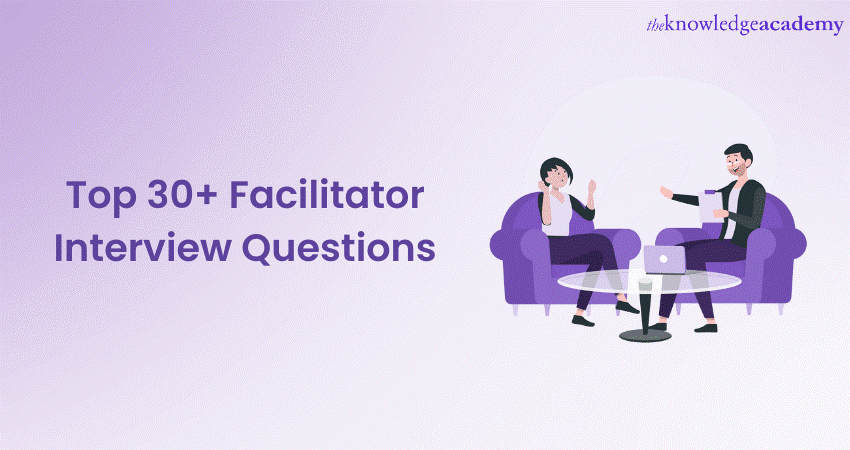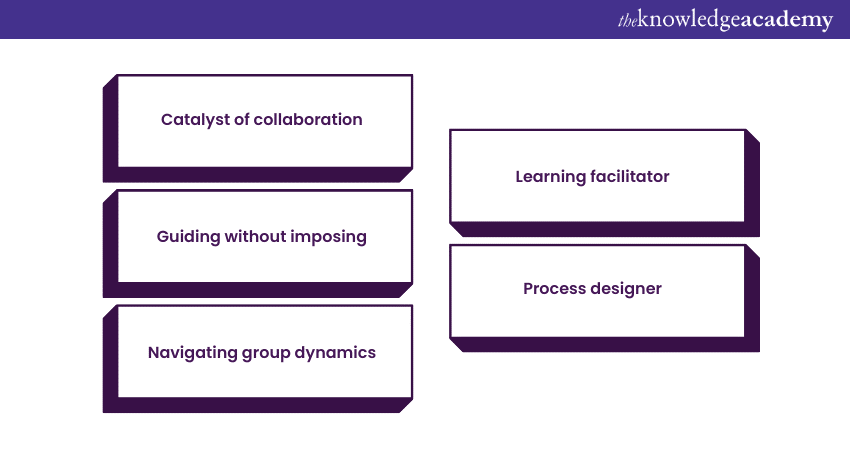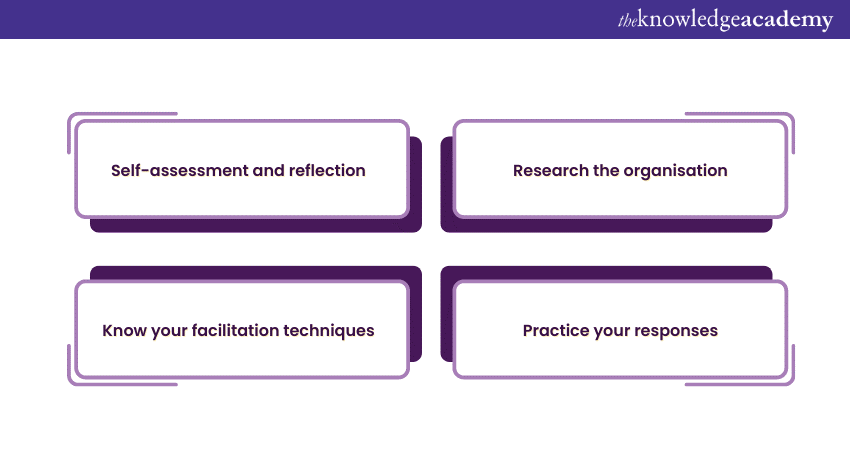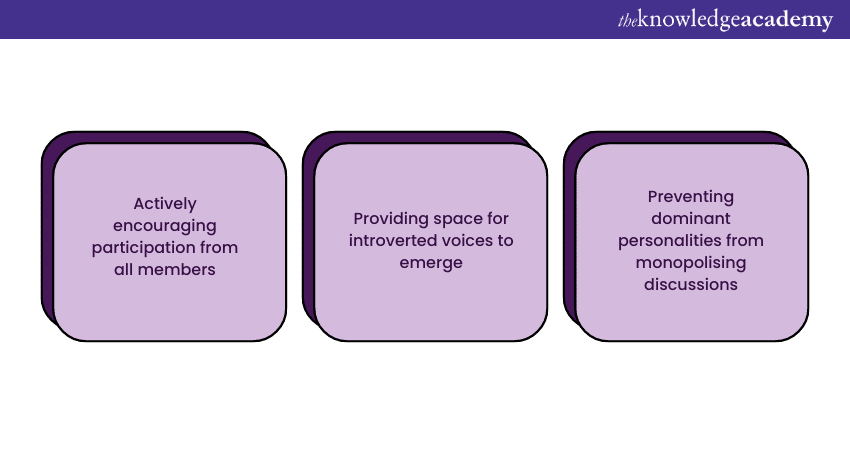We may not have the course you’re looking for. If you enquire or give us a call on +61 272026926 and speak to our training experts, we may still be able to help with your training requirements.
Training Outcomes Within Your Budget!
We ensure quality, budget-alignment, and timely delivery by our expert instructors.

Facilitator interview questions are crucial for identifying individuals who can effectively guide group processes, ensuring that all participants' voices are heard, and helping teams achieve their goals. In today's collaborative work environment, Facilitators play a pivotal role in harnessing the collective intelligence of groups, driving consensus, and fostering creativity.
Selecting the right Facilitator for your team or organisation requires a keen understanding of the skills and attributes that make an effective Facilitator. These interview questions explore a candidate's ability to navigate group dynamics, manage conflicts, and create a conducive environment for productive dialogue. Read this blog to learn about the Facilitator Interview Questions and understand how to answer them and to better prepare for the interview.
Table of Contents
1) The Role of a Facilitator
2) Preparing for the Facilitator Interview
3) Top 30+ Facilitator Interview Questions
4) Conclusion
The Role of a Facilitator

A Facilitator is not just a moderator or a mediator; they are the architects of productive discussions, the weavers of collaborative narratives, and the conductors of harmonious teamwork. To comprehend the essence of this multifaceted role, let's delve deeper into the dimensions that define the role of a Facilitator.
At its core, the Facilitator acts as a catalyst, igniting collaboration among individuals with diverse backgrounds, perspectives, and Facilitation Skills. They craft an environment where the collective intelligence of the group can flourish. By fostering open and respectful dialogue, a Facilitator empowers participants to share their insights, ideas, and concerns, leading to holistic solutions that may have yet to be unearthed in siloed discussions.
A skilled Facilitator possesses the delicate art of guiding discussions without imposing their personal biases or opinions. They remain neutral, providing structure and direction to the conversation without swaying it towards a particular outcome. This neutrality encourages participants to engage authentically, knowing their viewpoints will be considered without judgment.
Flexibility and adaptability are the trademarks of a successful Facilitator. Each group is unique, with its dynamics, culture, and challenges. A Facilitator must be a chameleon, capable of tailoring their approach to suit the specific context. This might involve shifting techniques, altering communication styles, or modifying the process flow to ensure optimum results.
Ready to take your Facilitation skills to the next level? Explore our Industry Training and elevate your expertise, from effective communication to conflict resolution.
Preparing for the Facilitator interview

Navigating a Facilitator interview requires more than just rehearsing generic interview responses. It demands a comprehensive approach that showcases your expertise in guiding teams towards productive outcomes, your ability to manage group dynamics, and your adeptness at facilitating effective communication.
Before stepping into the interview room, you should do the following:
a) Reflect on your Facilitation experiences
b) Consider the workshops, meetings, and discussions you've led
c) Identify instances where you demonstrated exceptional communication skills, conflict resolution abilities, and adaptability
d) Recall successful sessions and those that presented challenges, as these experiences can offer valuable insights into your growth as a Facilitator
To truly stand out during the interview, familiarise yourself with the organisation's values, goals, and culture. You must understand the context of the meeting you'll be Facilitating. It is important because it helps tailor your answers and demonstrates your alignment with the organisation's mission. Research the industry trends, challenges, and opportunities the organisation faces, as this knowledge can help you provide insightful responses.
Demonstrate your knowledge of a diverse range of Facilitation techniques. Whether brainstorming sessions, focus groups, problem-solving workshops, or decision-making discussions, be ready to discuss how and when you've used these techniques effectively. Highlight instances where you adjusted your approach based on the group's needs and the session's goals.
While the interview questions may vary, you should discuss several key topics. Practice your responses to questions about your Facilitation experiences, conflict resolution strategies, communication techniques, and approaches to handling challenging personalities. Consider using the Situation, Task, Action, Result (STAR) method to structure your responses, providing concrete examples that showcase your skills.
Facilitators often work with diverse groups and in various contexts. Highlight your adaptability in handling different group dynamics, organisational cultures, and topics. Share anecdotes that illustrate how you modified your Facilitation approach to suit the unique needs of each situation.
Join our renowned Train the Trainer course and gain the expertise you need to inspire and educate others effectively.
Top 30+ Facilitator Interview questions
The following are the Facilitator Interview Questions that will help you prepare better for the interview.
1. Can you describe your experience as a Facilitator?
Your response to this question should concisely overview your Facilitation background. Highlight the range of workshops, meetings, or events you've Facilitated. Mention the diversity of topics you've covered and the types of groups you've worked with. Emphasise your Facilitation's impact on the participants and the outcomes achieved.
2. What are the essential qualities of an effective Facilitator?
Here, you can showcase your understanding of the core attributes that make a Facilitator successful. Highlight qualities such as active listening, neutrality, adaptability, empathy, and strong communication skills. Explain how these qualities foster a productive and inclusive environment during Facilitated sessions.
3. How do you handle challenging personalities during a Facilitated session?
In answering this question, demonstrate your ability to manage diverse personalities and potential conflicts. Share strategies you've employed to navigate challenging situations while maintaining a neutral and respectful stance. Emphasise your commitment to ensuring that all participants feel heard and valued, regardless of their personalities.
4. Can you describe a successful Facilitation experience and what made it successful?
Provide a detailed account of a Facilitation session that is particularly successful. Describe the session's goals, the techniques you used, and the outcomes achieved. Highlight how your preparation, engagement strategies, and management of group dynamics contributed to the session's success. Mention any positive feedback or tangible results that resulted from the session.
Remember, these general questions showcase your technical skills, interpersonal abilities, and capacity to create a positive and impactful Facilitation environment. Use specific examples and anecdotes to make your responses vivid and engaging, demonstrating your expertise as a Facilitator.
Ready to enhance your Facilitation skills? Dive into our Facilitation Skills Training course and gain mastery in guiding discussions, fostering collaboration, and creating inclusive environments.
5. How do you choose the proper Facilitation techniques for different situations?
Selecting the appropriate Facilitation technique requires a keen understanding of the group's goals, dynamics, and the nature of the discussion. Explain how you assess these factors to make informed decisions. Discuss how you evaluate the need for brainstorming, consensus-building, problem-solving, or other techniques based on the session's objectives.
6. Can you explain the concept of "icebreakers" and provide an example?
Icebreakers are activities used to warm up a group and create a positive, comfortable atmosphere at the start of a session. Offer an example of an icebreaker you've used, highlighting how it helped participants get to know each other, reduce initial tension, and set the tone for open communication.
7. What strategies do you use to encourage participation and engagement during a session?
Demonstrate your ability to engage participants by discussing strategies to ensure everyone's voice is heard. Talk about techniques like open-ended questions, group discussions, interactive activities, and visual aids that encourage active participation. Emphasise your efforts to create a safe environment that promotes open sharing of ideas.
8. How do you manage time effectively during a Facilitated meeting or workshop?
Effective time management is crucial in Facilitating a successful session. Describe your approach to structuring the session's agenda, allocating time to different topics, and ensuring discussions stay on track. Share how you use timekeeping tools, such as timers or visual cues, to manage time and create a balanced flow of activities.
Mastering these Facilitation techniques requires a deep understanding of group dynamics and a versatile skill set. By demonstrating your expertise in choosing the proper methods, creating engaging sessions, and managing time effectively, you convey your capability to guide groups towards meaningful outcomes.
9. How do you handle conflicts during a Facilitated session?
Explain your approach to managing conflicts in a Facilitation setting. Discuss your commitment to remain neutral and ensure the competition does not derail the session. Emphasise your focus on addressing the root causes of conflicts and guiding participants towards a constructive resolution while maintaining respect.
10. Can you share an example of a time when you successfully resolved a conflict during Facilitation?
Provide a real-life example of a conflict that emerged during a Facilitated session. Detail the steps you took to manage the conflict, highlighting your ability to remain composed and objective. Discuss how you Facilitated open dialogue, helped participants understand each other's perspectives, and ultimately led the group to a mutually agreeable solution.
By addressing conflict resolution with poise and demonstrating your ability to guide discussions from tension to collaboration, you demonstrate mastery of one of the most crucial aspects of Facilitation. Conflict resolution showcases your leadership skills and underscores your capacity to create an environment where diverse opinions contribute to innovative solutions.
11. What steps do you take to prepare for a Facilitation session?
Outline the critical stages of your preparation process. Discuss how you gather information about the session's objectives, the participants' backgrounds, and any specific challenges or concerns. Describe how you tailor your approach based on these factors to ensure the session addresses the participants' needs and goals.
12. How do you tailor your Facilitation approach to the goals of a specific session?
Illustrate your adaptability by explaining how you customise your Facilitation approach for different sessions. Talk about your ability to align your techniques, activities, and communication style with the desired outcomes of the session. Highlight your flexibility in selecting appropriate tools and strategies that resonate with the group's objectives.
A strong emphasis on preparation and planning demonstrates your commitment to delivering impactful Facilitation sessions. By showcasing your ability to gather relevant information, design purposeful agendas, and adapt your approach to varying contexts, you position yourself as a Facilitator who is not only skilled but also strategic in achieving desired outcomes.
13. How do you measure the success of a Facilitated session?
Explain your criteria for determining the success of a Facilitated session. Discuss qualitative and quantitative measures, such as participant engagement, achievement of session objectives, and generating actionable outcomes. Highlight your ability to gauge participants' reactions and their perception of the session's value.
14. Can you discuss a time when a session didn't go as planned and how you handled it?
Share an example of a session that faced unexpected challenges or didn't go as anticipated. Describe how you managed the situation, adapted your Facilitation approach, and guided the group towards a positive outcome. Emphasise your ability to stay composed and focused on achieving the session's objectives despite unforeseen obstacles.
15. Discuss your approach to incorporating participant feedback
Illustrate your commitment to continuous improvement by discussing how you gather participant feedback after a session. Explain how you use feedback to refine your Facilitation techniques, adapt your approach, and enhance the overall experience for future sessions. This showcases your responsiveness to participants' needs and dedication to delivering value.
16. How do you assess long-term impact?
Discuss your approach to assessing the long-term impact of Facilitated sessions. Explain how you measure whether the session's outcomes have contributed to the participants' growth, improved teamwork, or led to actionable organisational changes. This demonstrates your holistic perspective on Facilitation's role in achieving lasting results.
17. Are you comfortable using various collaboration and communication tools for virtual Facilitation?
Address your familiarity with virtual Facilitation tools like video conferencing platforms, virtual whiteboards, polling software, and breakout room features. Discuss your experience with using these tools to create interactive and engaging virtual sessions.
18. How do you troubleshoot technical issues during virtual Facilitation?
Share your strategies for addressing technical challenges that may arise during virtual sessions. Discuss how you remain composed, offer clear instructions to participants, and quickly resolve issues to ensure the session continues smoothly.
19. How do you stay updated on the latest Facilitation techniques and best practices?
Discuss your strategies to keep yourself informed about Facilitation's latest trends and best practices. Mention resources such as books, articles, online courses, workshops, and industry conferences that you actively seek out to expand your knowledge and skills.
20. Can you share an example of how you incorporated feedback to enhance your Facilitation skills?
Provide a real-life example of when you received constructive feedback from participants or colleagues. Describe how you embraced this feedback as an opportunity for growth. Explain how you adjusted your Social Facilitation approach based on the input, leading to improved participant engagement, smoother sessions, or better outcomes.
21. Can you explain how you embrace diverse perspectives?
Diversity in a group brings together individuals with varying backgrounds, experiences, and viewpoints. A skilled Facilitator recognises that these diverse perspectives are wellsprings of innovation and fresh ideas. By embracing and amplifying these differences, Facilitators can guide discussions that lead to more comprehensive solutions and creative outcomes.
22. How do you foster inclusive environments?

Inclusion goes hand in hand with diversity. An inclusive Facilitator ensures that every participant feels valued, respected, and heard, regardless of background. This involves:
a) Actively encouraging participation from all members.
b) Providing space for introverted voices to emerge.
c) Preventing dominant personalities from monopolising discussions.
23. How do you enhance problem-solving through Facilitation?
A diverse and inclusive environment enhances the problem-solving potential of a group. Facilitators encouraging individuals to share their unique perspectives contribute to a rich tapestry of ideas. This approach broadens the range of possible solutions and fosters a sense of collective ownership over the outcomes.
24. Can you describe how do you challenge biases and assumptions?
Facilitators have the opportunity to challenge biases and assumptions that may arise during discussions. By addressing biases and gently redirecting conversations, Facilitators confirm that decisions are based on objective analysis rather than preconceived notions. This contributes to more equitable and just outcomes.
25. How do you leverage cultural intelligence?
In an increasingly globalised world, Facilitators often work with diverse cultural groups. Cultural intelligence, the ability to understand and adapt to different cultural norms and practices, is essential. Skilled Facilitators leverage cultural intelligence to create an atmosphere where everyone feels comfortable expressing themselves, regardless of cultural differences.
26. How do you ensure neutrality and impartiality?
Facilitators must maintain a neutral stance, refraining from expressing personal opinions or biases that could influence discussions. This impartiality ensures that participants feel their contributions are valued regardless of the Facilitator's personal views. A commitment to neutrality fosters an atmosphere where diverse opinions can be freely expressed.
27. How do you maintain confidentiality and privacy?
Participants often share sensitive information during facilitated sessions. Facilitators have a responsibility to maintain confidentiality and protect participants' privacy. Ethical Facilitation involves ensuring that information transmitted remains within the confines of the session and is not disclosed without explicit consent.
28. How do you ensure respectful communication?
Ethical Facilitation hinges on respectful communication. Facilitators should model respectful language and behaviours, discouraging disrespectful comments or personal attacks. This approach cultivates an environment where participants feel safe expressing their views without fear of ridicule or criticism.
29. Can you describe how do you ensure inclusive engagement?
Ethical Facilitators strive to engage all participants, ensuring that each voice is heard and valued. This includes creating opportunities for introverted participants to share, addressing any attempts to dominate discussions, and actively seeking input from individuals who may be marginalised or less vocal.
30. How do you ensure informed consent?
Participants should clearly understand the purpose and objectives of a Facilitated session. Ethical Facilitators inform participants about the session's goals, the topics to be covered, and any activities involved. This ensures that participants provide informed consent to engage in the session.
Conclusion
Navigating the intricacies of Facilitation demands technical proficiency and a deep understanding of communication, conflict resolution, diversity, and ethics. Armed with a diverse array of Facilitator Interview Questions and answers, you are now better prepared to showcase your expertise in guiding discussions, fostering inclusivity, and achieving impactful outcomes. Remember, as the Facilitator landscape continues to evolve, your ability to master these skills will play a pivotal role in driving successful interactions, making you a sought-after professional in any setting.
Frequently Asked Questions
Upcoming Business Skills Resources Batches & Dates
Date
 Facilitation Skills Training
Facilitation Skills Training
Fri 10th Jan 2025
Fri 28th Feb 2025
Fri 4th Apr 2025
Fri 16th May 2025
Fri 11th Jul 2025
Fri 19th Sep 2025
Fri 21st Nov 2025







 Top Rated Course
Top Rated Course



 If you wish to make any changes to your course, please
If you wish to make any changes to your course, please


